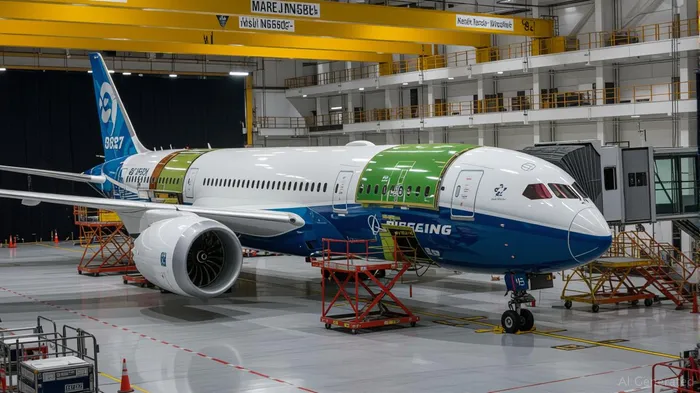Boeing's Balancing Act: Navigating Safety Scrutiny Amid Strong Demand
The crash of Air India Flight 171, a BoeingBA-- 787-8 Dreamliner, has thrust the aerospace giant into the spotlight once again, testing its ability to manage regulatory pressures and public skepticism while capitalizing on robust demand for commercial aircraft. Investors now face a critical question: Is Boeing's stock volatility a fleeting risk or a harbinger of deeper structural challenges? Let's dissect the risks and fundamentals shaping its future.
The Air India Crash: A Catalyst for Regulatory and Public Scrutiny
The June 2025 crash, which claimed 265 lives, has reignited concerns about Boeing's safety culture. Investigations are focusing on cockpit fuel control switches, which were accidentally operated mid-flight—a function intended solely for ground use. While the FAA has not yet issued a ground stop for the 787 fleet, the incident has rekindled memories of prior Boeing crises, such as the 737 MAX's 2018-2019 grounding.
The Aircraft Accident Investigation Bureau (AAIB) in India has been criticized for delayed transparency, exacerbating public distrust. Misinformation about the crash's cause has proliferated, with AI-generated claims further muddying the waters. Boeing's stock (BA) fell 7% in the days following the crash, reflecting investor anxiety.
The regulatory overhang remains a wildcard. If the AAIB concludes the crash stemmed from a systemic flaw in Boeing's design or manufacturing, liability claims could climb into the billions. Even without such a verdict, the scrutiny could lead to costly redesigns or operational restrictions, squeezing margins.
Demand Remains Strong, But Can Boeing Deliver?
Despite the crash's impact, Boeing's order backlog stands at a record 5,953 aircraft as of June 2025, fueled by major deals like Qatar Airways' $47 billion order for 210 planes and AviLease's $4.8 billion purchase of 30 737 MAXs. CEO Kelly Ortberg has declared the company “essentially sold out through the end of the decade,” underscoring the urgency to ramp up production.
However, Boeing's ability to fulfill this backlog is constrained by FAA-imposed production limits. The 737 MAX remains capped at 38 planes per month due to lingering quality control issues, such as the 2024 door plug defect. Boeing aims to increase this to 42/month by year-end, but FAA approval hinges on proving operational stability. Meanwhile, the 787 program faces its own hurdles: the AAIB's findings could delay any planned output increases for the Dreamliner.

Supply chain challenges add another layer of risk. While engine shortages have eased compared to Airbus's struggles, Boeing still faces bottlenecks in sourcing critical components, particularly for the 777X, which remains uncertified. A prolonged delay in that program could further strain production timelines.
The Investment Dilemma: Near-Term Risks vs. Long-Term Demand
Investors must weigh two competing narratives:
1. The Bull Case: Boeing's backlog is a fortress, and commercial aviation demand is structurally robust. Airlines are upgrading fleets to meet ESG goals and passenger growth, with the global fleet expected to double by 2040. Boeing's dominance in wide-body jets like the 787 and 777X positions it to capture this growth. If production constraints ease and the Air India investigation concludes with no systemic fault, the stock could rebound sharply.
- The Bear Case: Regulatory penalties, liability costs, and reputational damage could erode profitability. Even a $1 billion settlement for the Air India crash—or stricter cockpit design mandates—would dent earnings. Competitors like Airbus (EPA:AIR), which delivered more planes in 2024 despite its own supply chain issues, are capitalizing on Boeing's struggles.
Actionable Insights for Investors
- Near-Term Caution: Avoid aggressive bets on Boeing until the Air India investigation concludes. Monitor the AAIB's July 11 preliminary report for clues on liability exposure.
- Long-Term Opportunity: Consider Boeing as a strategic hold if it can stabilize production and resolve the Dreamliner inquiry. The backlog's value ($450 billion in commitments) provides a floor for valuation.
- Sector Diversification: Pair Boeing with airlines like DeltaDAL-- (DAL) or United (UAL) to hedge against production risks, or explore aerospace ETFs like the iShares Global Aerospace & Defense (ITA).
Final Analysis
Boeing's stock volatility is a microcosm of its broader challenge: balancing the urgency to meet surging demand with the need to rebuild trust. While the Air India crash introduces near-term headwinds, the company's order backlog and secular growth tailwinds suggest resilience. Investors must decide whether Boeing can navigate this balancing act—or if the regulatory and operational hurdles will ground its recovery.
For now, patience is the watchword. Wait for clearer skies before betting on a takeoff.
Tracking the pulse of global finance, one headline at a time.
Latest Articles
Stay ahead of the market.
Get curated U.S. market news, insights and key dates delivered to your inbox.

Comments
No comments yet